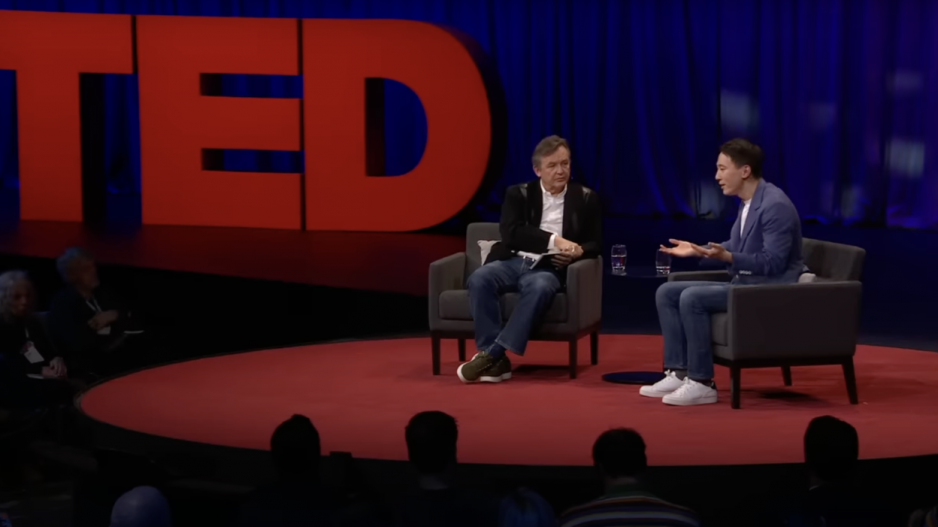The questions about the potential for an app from China to sway voters were posed in the American context, for an audience of mostly American visitors, but in a ballroom at the Vancouver Convention Centre.
Chris Anderson, the TED Conference’s “curator,” interviewed Shou Zi Chew, the Singaporean CEO of Chinese-owned short video app TikTok, on April 20.
It was just over two months since The Globe and Mail reported on a leak from Canada’s spy agency. Disinformation via a different app from China, WeChat, helped sway voters in Richmond during the 2021 federal election, according to the Canadian Security Intelligence Service.
It was almost a month since members of a U.S. Congress committee grilled Chew about national security concerns surrounding his company.
Near the end of the 40-minute TED sit-down, Anderson asked what would happen if the Chinese government looked at an upcoming U.S. election and figured it could use TikTok to favour one party over another or cause civil unrest by amplifying "certain troublemaking, disturbing people causing uncertainty, spreading misinformation, et cetera.”
“If you were required by [parent company] ByteDance to do this, first of all, is there a pathway where theoretically that's possible?” Anderson asked. “What’s your personal line in the sand on this?”
Chew called the scenarios Anderson described “highly hypothetical” and boasted that corporate transparency and third-party reviews of TikTok’s source code and content on the platform are enough to address those concerns.
“We give people access to monitor us and we can just make it very, very transparent. And that's our approach to the problem,” Chew said.
“So you will say directly, to this group,” Anderson said, referring to the audience, “that the scenario I talked about of, theoretical Chinese government interference in an American election, you can say that will not happen?”
Chew replied: “I can say that we are building all the tools to prevent any of these actions from happening. And I'm very confident that, with an unprecedented amount of transparency that we're giving on the platform, we can reduce this risk to as low as zero, as possible.”
“To as low as zero, as possible?” a skeptical Anderson repeated each word slowly.
Chew: “To as close to zero as possible.”
“As close to zero as possible – that’s fairly reassuring, fairly,” Anderson deadpanned amid a brief eruption of nervous laughter from the audience.
“I mean, how would the world know?” Anderson asked.
“If you discovered this, or thought you had to do it, is this a line in the sand for you? You would not let the company that you know, now, and that you are running, do this?”
Chew: “Absolutely. That's the reason why we're letting third parties monitor this, because if they find out, you know, they will disclose this.”
One prominent third party that reviewed TikTok was the Munk School of Global Affairs’ Citizen Lab at the University of Toronto. While it concluded that TikTok isn’t spyware, the Citizen Lab’s director, Prof. Ron Deibert, cautioned it gobbles up a lot of personal data just like other social media apps.
Coinciding with Chew’s testimony in Washington, D.C., Deibert wrote on his blog that TikTok is not as open and transparent as Chew claims.
“Our analysis was explicit about having no visibility into what happened to user data once it was collected and transmitted back to TikTok’s servers,” Deibert wrote. “Although we had no way to determine whether or not it had happened, we even speculated about possible mechanisms through which the Chinese government might use unconventional techniques to obtain TikTok user data via pressure on ByteDance.”
Deibert is not alone. At the Vancouver International Privacy and Security Summit on Feb. 23, the official privacy watchdogs for Canada, Alberta, B.C. and Quebec announced a joint investigation of TikTok. The next week, the federal government cited national security concerns when it banned TikTok from public service devices. Provinces and municipalities followed suit.
On April 4, the U.K.’s Privacy Commissioner announced a £12.7 million ($21.48 million) fine against TikTok for allowing up to 1.4 million children under 13 on the app in 2020, despite rules banning children that age.
In a March interview, a professor in the School of Information Studies at McGill University said TikTok’s claim that data is housed on U.S. servers is hollow because workers in China are legally obliged to cooperate when the Chinese government demands to see data. Benjamin Fung said TikTok’s parent ByteDance is a Chinese company, wearing a mask to pretend it is American when convenient.
“If there’s strong evidence showing that the engineer in China can access the data in Canada, or in America, then the privacy commissioner should look into that very closely,” Fung said.
Fung said TikTok is built on a very powerful “recommender system,” a machine learning algorithm that helps decide what the user sees.
“This tool has the power to change people’s perception on some particular issues,” Fung said.



